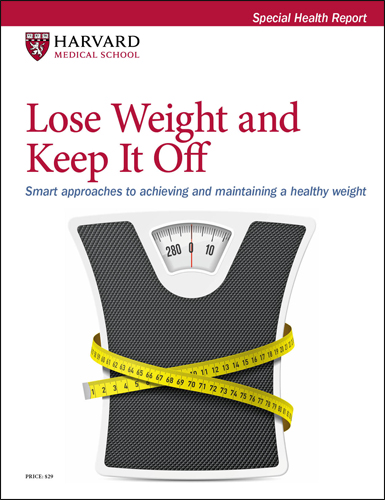A healthier way to look at body fat
You need some body fat for optimal health. However, where it's stored may affect your risk of health problems.

Americans have a big weight problem. According to the CDC, about 42% of men ages 60 and older are obese, storing excess body fat. "But body fat in itself is not the issue, as your body needs a certain amount of fat to stay healthy," says Dr. Caroline Apovian, co-director of the Center for Weight Management and Wellness at Harvard-affiliated Brigham and Women's Hospital. "Rather, excess stored fat and especially its location in the body have the greatest impact on health."
Body fat facts
Here is how your body stores fat. When you eat, the main components of food — protein, carbohydrates, and dietary fat — are broken down and mostly metabolized as energy to fuel the basic biological processes that keep you alive and kicking.
Any unused fuel gets stored as lipids (fatty molecules) in fat cells, called adipocytes, all around the body. The amount of that stored fuel — measured in calories — determines how much fat cells grow. In fact, fat cells can expand or shrink in size by up to a factor of 50.
You never lose fat cells, and once you reach adulthood, the number more or less stays the same. You also can't control where your body stores fat. "Factors like body type, age, hormones, and genetic predisposition all determine where excess fat ends up," says Dr. Apovian.
Stored fat in itself is not bad. The body needs fat reserves for emergency energy, and fat helps insulate the body and protect vital organs. Fat cells also release leptin, a hormone that acts on the brain to decrease appetite and help regulate body weight.
It's how much body fat you have, and where, that makes a difference to your health. In most people, about 90% of body fat is subcutaneous, meaning it lies in a layer just beneath the skin. The remaining 10% is visceral fat, which lies beneath the abdominal wall and in the spaces surrounding the liver, intestines, and other organs. Of the two, visceral fat is the most troublesome: having too much increases the risk for type 2 diabetes, heart disease, and a fatty liver. While fat is practically everywhere in the body — chest, back, stomach, glutes — the midsection is where most men see (and feel) excess amounts
Image: © Creative Credit/Getty Images
Why does body fat build up? It's a myth that eating fat makes you fat, and in fact, it can be the opposite. "Many natural foods high in healthy mono- and polyunsaturated fats can make you feel fuller faster because fats are slow to digest," says Dr. Apovian. She points out that the highly touted Mediterranean diet, which was recently ranked the healthiest diet, contains 40% to 50% fat.
Weight gain is caused by eating too many calories, no matter the source. The biggest calorie culprits are ultra-processed foods, such as frozen pizza, soda, fast foods, and salty snacks. Americans eat more of them than ever, according to a study published online Oct. 14, 2021, by The American Journal of Clinical Nutrition that examined the daily eating habits of about 41,000 adults over a period of 18 years.
Other research has found that people whose diets contain high amounts of ultra-processed foods eat around 500 extra calories per day compared with people who eat few of these foods. "The research suggests that ultra-processed foods 'fool' your brain into eating more calories than if you are eating whole foods or unprocessed foods," says Dr. Apovian. "If your body doesn't use those extra calories, they get stored as fat, and that is why people gain weight."
Using the fuel
There are different ways to burn excess stored fat. The first is to reduce your calorie intake. When you consume fewer calories than your body needs, your body converts stored fat into usable energy for fuel. As a result, fat cells get smaller, and you lose weight.
Low-carb diets follow this approach since carbohydrates are the body's primary source of calories. Research has shown low-carb diets can help jump-start weight loss, but the effect can wane after about six months to a year. "Part of the problem is that low-carb diets are tough to maintain for long periods," says Dr. Apovian.
This is why many nutritionists promote an all-around healthy diet that includes adequate amounts of protein, carbohydrate, and fat as well as essential vitamins and minerals. "A low-carb diet can help in the short term, but if you don't adjust your overall eating habits, you can gain it all back," says Dr. Apovian.
The other way to burn fat and shrink fat cells is with exercise. Moderate-intensity aerobic exercise like brisk walking, cycling, and swimming can force the body to tap into stored fat for energy. (Guidelines suggest you get at least 150 minutes per week of moderate-intensity exercise.) However, how quickly your body burns fat depends on your body size and exercise intensity.
Resistance (weight) training also can help older men lose excess stored fat by increasing muscle mass. "Men naturally lose muscle mass as they age, and increasing muscle can make their body burn more calories," says Dr. Apovian.
An analysis published online Sept. 21, 2021, by Sports Medicine found that people who engaged in 45 to 60 minutes of resistance training two to three times a week for five months reduced both their visceral fat and total body fat.
"But if you want to lose weight, you can't count on exercise alone. You will also need to reduce your calorie intake," says Dr. Apovian. "And to help keep it off, you need to do resistance training at least two to three times per week."
Image: © Creative Credit/Getty Images
About the Author

Matthew Solan, Executive Editor, Harvard Men's Health Watch
Disclaimer:
As a service to our readers, Harvard Health Publishing provides access to our library of archived content. Please note the date of last review or update on all articles.
No content on this site, regardless of date, should ever be used as a substitute for direct medical advice from your doctor or other qualified clinician.
















